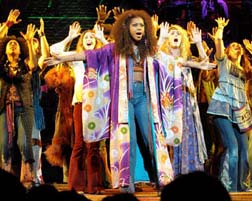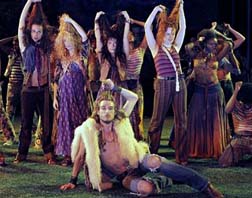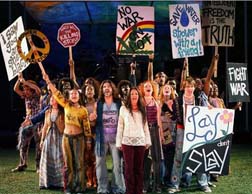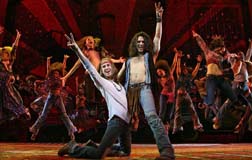By Lucy Komisar
My guest at Hair was an old friend who had been a leader of the 1968 protest movement in Germany. The era was so significant to him, that his news photo leading a march was years later (only partly tongue-in-cheek) on his wedding announcement. After ’68, he was elected to parliament and for decades was the chief spokesman on foreign affairs for the Social Democrats. As we left the theater, he shook his head. He said, We were much more political.

It was my reaction as well. The sector of the Sixties movement that writers James Rado and Gerome Ragni immortalized with the rock opera Hair was not of the people who made the political movement. They were the self-centered counter-cultural mass, occasionally activists but essentially existentialists, overtaken by the sensuality of music, drugs and sex which to them meant freedom and happiness. It was a double-edged sword for the women. Jeanie (Kacie Sheik) is pregnant, but for her love is na¯ve and without consequences.
They got involved in politics almost as an afterthought and not in any way that could be significant, except as shock troops for the anti-war movement, if such an ironic description can be allowed. The protests that helped stopped the war, which becomes a factor in the play, were not organized by people stoned on drugs. So, some 40 years ago, the in-your-face taunts of protesters in long hair and colorful clothes (or no clothes) was a small piece of political history.
That said, and history corrected, Diane Paulus’s revival of the 1968 musical now on Broadway captures the mood of part of a generation of young people (a minority of their contemporaries) that helped change the culture as well as provide some of the bodies that protested the America’s great criminal blunder of the time. Their counterculture, if not their politics, became mainstream enough to be exploited by advertising and by fashion, as you can see from Michael McDonald’s vivid costumes.

The underlying story would have been understood in 1968. Now, I wish this play had had more story, rather than being just a string of production numbers.
We are shown collective sensitivity and angst, joy in music and sex, long hair, flowers, beads and patched jeans, and politics which is largely sloganeering: Power now, Freedom now, Resist the draft. A guru in saffron robes adds more color.
For the flower children,’ the revolution stopped at getting a job, which in the Sixties was not very difficult. You can’t help sympathize with long-suffering parents: Your father and I love you, but how long do we have to support you.

Politics started only when the draft notice arrived. This was 1967. A draftee is warned, You will go, and you will live to rape and to kill. We’re all Vietnam bait. They burn their draft cards, levitate the Pentagon and march on the FBI, where they are tear-gassed. They protest at the Whitehall Street induction center in New York. Hell no, we won’t go.
Yes, there really were political enemies. A suit speaks for the military industrial complex. A tight-faced woman demands to know What’s going on in Red China?

The characters are more symbols than real people. The free spirited hero, Berger (Will Swenson), seems to have sprung whole from the East Village. His friend Claude (Gavin Creel), is rather clueless (not political) as he ponders whether to burn his draft card and later how to respond when he’s called for induction.
But the music and lyrics are still stunning. Good Morning Starshine reverberates in your heart as well as your ears. Let the Sun Shine in is a communal prayer. Sasha Allen is a smashing songstress as she leads The Age of Aquarius.
And Karole Armitage’s twisting, gyrating choreography makes people want to swarm onto the stage – where they are invited at the end of the show.
Hair. Book & Lyrics by James Rado and Gerome Ragni, Music by Galt MacDermot. Directed by Diane Paulus, Choreographed by Karole Armitage. Al Hirschfeld Theatre, 302 West 45th Street, New York, NY. 212-239-6200. Opened March 31, 2009.

